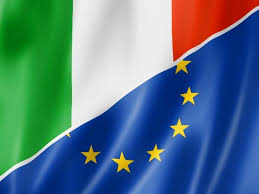
According to a report by the Italian news agency AGI, citing EU sources, Italy has been asked to submit a new budget by the European Commission after the administrative arm of the block rejected the so called populist budget of the debt ridden country.
The Commission later held a news conference to formally announce the decision.
EU has been demanding strict fiscal prudence from the right-wing League and anti-establishment 5-Star Movement led government in Italy but the ruling coalition presented a budget plan to the block earlier this month that showed an increase of fiscal deficit to 2.4 per cent of the gross domestic product of the country.
This increase in the fiscal deficit is not according to EU norms and requirements that mandate that every member state should strive to steadily reduce the fiscal deficit to achieve a balanced budget ultimately. The fiscal deficit in this year’s budget proposal by the Italian government is a significant increase compared to the figure targeted this tear at 1.8 per cent.
This is first occasion that the Commission has ordered any member state to make alterations in its budget since the government arm was given greater powers in 2013 to intervene in the budget plans of member states.
The budget has drawn sharp conflict between the Italian government and the Commission with Italian ministers trading insults with commissioners even as the executive arm of the EU sent a letter to Rome warning it about the budget and saying that it reflected an "unprecedented" deviation from the fiscal commitments that the country had provided to the Commission earlier.
Despite the Italian ministers resorting to a more moderate tone in deliberations with the commission recently, its Prime Minister Giuseppe Conte does not see any no reason to make any alterations to the budget proposal.
Concerns about the free-spending fiscal plans of Italy were earlier expressed by the head of the euro zone's rescue fund. The chief however had added that it is not yet time to hit the panic button because so far there has been very limited contagion to other European countries.
"We are worried about Italy," Klaus Regling told a news conference, saying that the Italian government's fiscal plans were a risk.
He however clarified that the debt issue of Italy were different form the one that was faced by Greece whose economy had to be bailed out through three aid packages from the euro zone during the last ten years or so.
He also issued warnings of the increasing issues that the banks of Italy were facing because of higher yields on Italy's debt. He however also explained that the issues faced by Italian banks were not the same as those experienced by Spanish banks at the time that a rescue package had to be sought from the European Stability Mechanism rescue fund in 2012.
"In Italy itself there is contagion to the banking sector" because of the falling value of Italy's debt held by lenders, Regling said.
(Source:www.rte.ie)
The Commission later held a news conference to formally announce the decision.
EU has been demanding strict fiscal prudence from the right-wing League and anti-establishment 5-Star Movement led government in Italy but the ruling coalition presented a budget plan to the block earlier this month that showed an increase of fiscal deficit to 2.4 per cent of the gross domestic product of the country.
This increase in the fiscal deficit is not according to EU norms and requirements that mandate that every member state should strive to steadily reduce the fiscal deficit to achieve a balanced budget ultimately. The fiscal deficit in this year’s budget proposal by the Italian government is a significant increase compared to the figure targeted this tear at 1.8 per cent.
This is first occasion that the Commission has ordered any member state to make alterations in its budget since the government arm was given greater powers in 2013 to intervene in the budget plans of member states.
The budget has drawn sharp conflict between the Italian government and the Commission with Italian ministers trading insults with commissioners even as the executive arm of the EU sent a letter to Rome warning it about the budget and saying that it reflected an "unprecedented" deviation from the fiscal commitments that the country had provided to the Commission earlier.
Despite the Italian ministers resorting to a more moderate tone in deliberations with the commission recently, its Prime Minister Giuseppe Conte does not see any no reason to make any alterations to the budget proposal.
Concerns about the free-spending fiscal plans of Italy were earlier expressed by the head of the euro zone's rescue fund. The chief however had added that it is not yet time to hit the panic button because so far there has been very limited contagion to other European countries.
"We are worried about Italy," Klaus Regling told a news conference, saying that the Italian government's fiscal plans were a risk.
He however clarified that the debt issue of Italy were different form the one that was faced by Greece whose economy had to be bailed out through three aid packages from the euro zone during the last ten years or so.
He also issued warnings of the increasing issues that the banks of Italy were facing because of higher yields on Italy's debt. He however also explained that the issues faced by Italian banks were not the same as those experienced by Spanish banks at the time that a rescue package had to be sought from the European Stability Mechanism rescue fund in 2012.
"In Italy itself there is contagion to the banking sector" because of the falling value of Italy's debt held by lenders, Regling said.
(Source:www.rte.ie)





